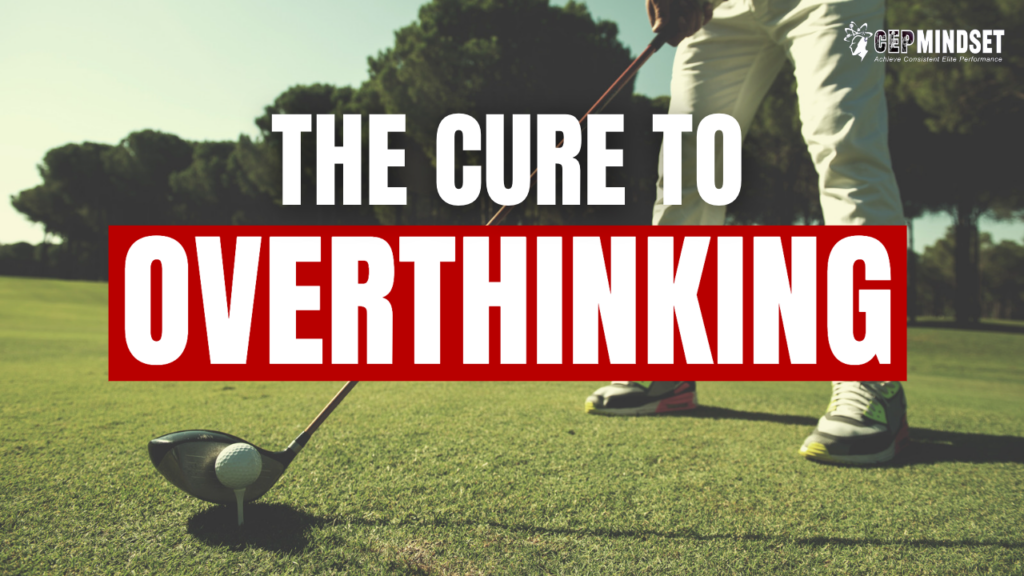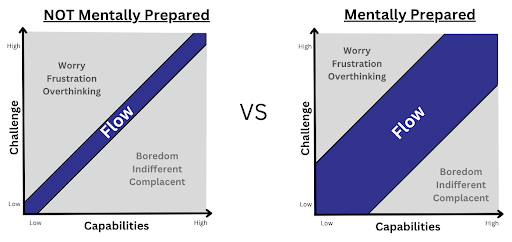
Every athlete experiences the negative effects of overthinking – some worse than others.
Maybe you overthink trying to decide whether to shoot, pass, or move.
Maybe you are a golfer and you have 100 swing thoughts when you stand over the ball, let alone when you have a 6 foot putt to win the round.
Regardless, most athletes experience overthinking after mistakes and when the pressure rises.
Think More to Think Less
There is one overarching reason athletes overthink. It is because you have not thought enough before the competition.
By thinking more beforehand, aka mental preparation, you will be able to quiet your mind during the competition.
Unfortunately, most athletes are not consistently and effectively training their mind. So they fall victim to the gremlins of perfectionism, fear of failure, and doubt – which manifest in the form of overthinking on the field of play.
Here is the 3 step process to stop overthinking:
STEP 1: Think More Before
When you overthink as an athlete, it means that you are having extra thoughts that are not helpful.
Where do these thoughts come from?
They come from your subconscious or conscious worries, fears, or frustrations.
The best way to deal with these distracting thoughts is to shine a light on them and make them conscious.
The time to do this is before you play, not during. Trying to figure this out during a competition won’t work out very well.
For example, it is best to go through, reflect, and understand the above concepts on how to think differently before a competition. By ingraining a concept in your mind, you will be better able to tap into it during the competition.
Plan to Cope
This form of mental preparation is also referred to as coping planning.
It means you plan to cope with the stressors of an event. It is a type of contingency plan – if x happens, then I do y.
This way you are prepared for how you want to think in the competition, instead of your subconscious fears, worries, and frustrations causing you to overthink.
This concept can be difficult for athletes because our society glorifies being busy and doesn’t value the importance of slowing down.
But the “unsung heroes” of success are in the moments of slowing down, reflecting, and being intentional about how you show up.
The diligence in preparing for success is what separates the best from the rest.
Find Your Ebb and Flow
If you think you are too good to slow down, then compare yourself to a race car. They need pit stops to refuel and avoid burning out their tires, and they need to slow down before sharp corners so they can accelerate out and avoid crashing.
The ebb and flow of life is everywhere.
Learning to create the ebb and flow for your life is a crucial skill for success.
By embracing this concept to think more before you are expanding your probabilities to be in the flow state during competition.
Mihaly Csikszentmihalyi created a model for flow that is about finding the right balance between your capabilities and the challenge.
- Too little challenge = boredom
- Too much challenge = worry & frustration
But you can widen the range of your flow state (see diagram below) by consistently and effectively training your mind.

STEP 2: Think Differently
We at CEP Mindset are big proponents of thinking differently.
We frame it this way because most people and most athletes are just going with the status quo ways of thinking – and it is actually holding a lot of people back.
The most common mistakes include:
- Be positive
- Just be confident
- Don’t worry about it
These might be the mental outcomes you want, but they don’t help you get into that state.
Imagine if this blog post simply said the way to stop overthinking is to just stop overthinking – that would be asinine.
Instead, here are the main concepts you will need to understand to stop overthinking:
- Embrace Imperfection
Pursue excellence while understanding you are human and will not be perfect along the way – just like the best athletes in the world make mistakes – so will you.
- Force it vs Let it Happen
Stop trying to control the results and be perfect. Trust your training and let your body do what you have trained it to do – let it happen. This especially applies after mistakes.
- Flip the Risk on Mistakes
The more you fear mistakes, the more you will want to control the results and force yourself to be perfect. Instead, flip the risk and learn to embrace mistakes as learning opportunities – check out the full write up and video on the Fear Mindset vs Attack Mindset.
- Reframe Confidence
If you attach your confidence to results and praise, then when you make a mistake you start to lose your confidence and start overthinking. Instead, focus on owning your capabilities and keep playing with confidence – full write up and video here.
- Pressure is a Privilege
How we perceive pressure matters. If you perceive it as a threat and make it bigger than what it is, then it will hold you back. Click here for the full video and blog on performing under pressure. - Manage Expectations
If your mind is full of should, need to, and have to – you will be stuck overthinking. Learn to manage your expectations by seeing sports like playing a slot machine with variable outcomes, instead of a vending machine with predictable outcomes. Then use steps 1 and 3 to maximize your probabilities of achieving the desired results.
- Let go of Results
The number one mental block holding athletes back is the results trap. Check out the full write up and video on how to stop obsessing about results here.
- Be the Hero of Your Story
Too many athletes are constantly worried about what others think of them. Thinking about what other people might be thinking is a trap for overthinking. Click here to check out 7 tips to stop worrying about what others think and start being the hero of your own story.
STEP 3: Think Less with a Reset
By implementing these first two steps, you will instantly start seeing a decrease in the frequency and severity of overthinking.
However, it is unrealistic to believe you will never experience overthinking again. So, this step is about having an in-game strategy to help you stop overthinking when it is happening.
Our go to strategy for this is the Reset Routine – Click Here for the full write up and video.
In short, the Reset Routine provides a practical and personalized strategy that helps you slow down before and during a competition so you can get in the zone.
Acceptance
The core concept of the reset routine is Acceptance.
Unfortunately, acceptance is often misunderstood, but the reality is acceptance is a superpower that will help you better commit to the process.
Look back to step 2 – all the concepts you need to think differently about, revolve around the core concept of acceptance.
You need to learn to think differently.
You need to learn to feel and understand your emotions.
Then you need to accept and let go of the distracting thoughts and emotions.
This is the cure to overthinking.
Creativity and Simplicity
A common sport psychology strategy to help with overthinking is thought stopping or other various versions of managing your self-talk.
The problem is these strategies are boring, overcomplicated, and often add more thoughts – making things worse.
The solution is to focus on your inner narrative and identity to transform your mental game. That’s exactly what you get when you combine the Reset Routine with an Alter Ego.
Credit to my coach and mentor, Todd Herman, for writing the book The Alter Ego Effect – which is not about putting fixed labels on you as a person.
Instead, an Alter Ego brings simplicity and creativity to sport psychology. For example, Todd helped Kobe Bryant make the Black Mamba – which is one of the most legendary and powerful mental game strategies ever created.
Find out more about how we help athletes use this strategy in the full Alter Ego blog and video – click here.
________________________________________________________________________________________
In summary, you can stop overthinking by learning how to consistently and effectively train your mind.
Stop falling victim to the gremlins of perfectionism, fear of failure, and doubt – and follow this 3 step process:
- Think More
- Think Differently
- Think Less with a Reset
I hope you found this helpful.
Please share this with anyone you think would benefit from this post.


 Nicholas Santino is a Senior High-Performance Coach, PhD Candidate, and the official Mental Performance Consultant for Elite Prospects. From his specialized psychology research program, to his PhD studies, Nicholas has gained a tremendous foundation of knowledge and appreciation for the human experience. His passion for psychology has accumulated to a commitment to studying and applying positive psychology and stoicism. This commitment has led Nicholas to conduct many research studies focusing on understanding why and how some people thrive and prosper while others do not. His admiration for evidence-based solutions has propelled Nicholas to produce studies revolving around mindfulness, grit (perseverance and passion), performance, quality participation, social relationships, and well-being.
Nicholas Santino is a Senior High-Performance Coach, PhD Candidate, and the official Mental Performance Consultant for Elite Prospects. From his specialized psychology research program, to his PhD studies, Nicholas has gained a tremendous foundation of knowledge and appreciation for the human experience. His passion for psychology has accumulated to a commitment to studying and applying positive psychology and stoicism. This commitment has led Nicholas to conduct many research studies focusing on understanding why and how some people thrive and prosper while others do not. His admiration for evidence-based solutions has propelled Nicholas to produce studies revolving around mindfulness, grit (perseverance and passion), performance, quality participation, social relationships, and well-being. A Native of Quebec, Sara was part of the St. Lawrence University Women’s Ice Hockey team that competed in the NCAA Division 1 hockey league ECAC. During this time, Sara helped her team appear in four ECAC Hockey Tournaments and two NCAA Frozen Fours, and was a four-time member of the ECAC Hockey All-Academic Squad. Following her career at St. Lawrence University, Sara played one year of professional hockey with Lugano, where she truly honed her skills in understanding the intricate connection between mindset and performance.
A Native of Quebec, Sara was part of the St. Lawrence University Women’s Ice Hockey team that competed in the NCAA Division 1 hockey league ECAC. During this time, Sara helped her team appear in four ECAC Hockey Tournaments and two NCAA Frozen Fours, and was a four-time member of the ECAC Hockey All-Academic Squad. Following her career at St. Lawrence University, Sara played one year of professional hockey with Lugano, where she truly honed her skills in understanding the intricate connection between mindset and performance.
 Blair has over 13 years of experience as a Professional Dancer, Assistant Dance Captain & Cast Manager, as well as an additional 17 years of training. Over the last 3 decades, she has lived and experienced first hand the highest of highs & lowest of lows that come with pursuing a career in the Performing Arts.
Blair has over 13 years of experience as a Professional Dancer, Assistant Dance Captain & Cast Manager, as well as an additional 17 years of training. Over the last 3 decades, she has lived and experienced first hand the highest of highs & lowest of lows that come with pursuing a career in the Performing Arts.













